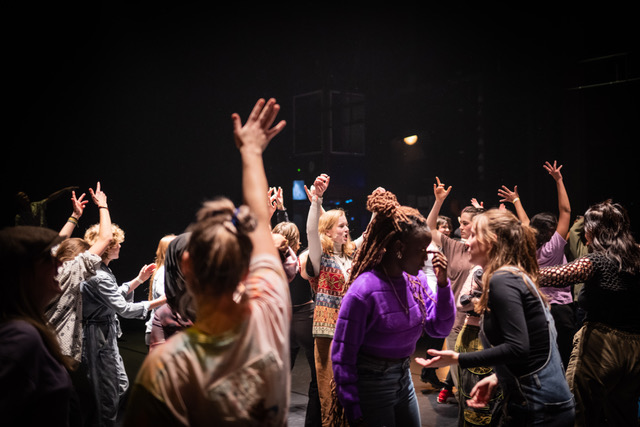Tremble without fearing for your life
Jonge Harten will be working together with two main guest artists again this year: theatre makers who will contribute to and leave their mark on the programme. During the festival they will demonstrate their own (new) work or related work of other relevant makers. Our guests this year are Alexandra Broeder and Mohamed Yusuf Boss. In preparation for this year’s edition of Jonge Harten we talked with them about their work and our festival. What characterizes their work? How do they feel about working with young people? And of course: what are their plans for Groningen?
Tremble without fearing for your life
Alexandra Broeder’s most recent piece, The Gift, is about longing for death, fear of death and about why life is not blissful for everyone. She’s one of the main guests of Jonge Harten 2022, where vulnerability is also one of her main themes. ‘I guess for me it’s all about susceptibility.’
It’s no coincidence that the dark side of life always plays an important role in the work of theatre maker Alexandra Broeder, and she presents her work in an eerie, provocative way. Similar to how children in horror films are portrayed, who turn out to be dark-sided creatures, with obscure powers. ‘Because their behaviour is different from what you’d expect, it undermines your sense of safety and it completely changes the image you had, and that you’d like to hang on to’, says Broeder.
Causing confusion
What she enjoys most about working with children and adolescents is that she’s able to cause confusion for adults, by playing with their expectations. She holds up a mirror to them. She makes them aware of being human. Take Sweet dreams, a previous piece by Broeder, that took place at night in the woods, where children kept watch over the audience until the end of the performance. ‘You really have to surrender to the experience. In these circumstances the audience is completely at its own mercy’.
How do you achieve that? How do you become a good person? And: can you embrace life, without wanting control? Or, like in the case of 22 year old Anouk van Kampen, who is the central character in The Gift: what do you do when you strongly feel that life is not meant for you, that it’s too heavy a burden to carry?
Social Issues
These are just a few of the questions that Broeder’s work focuses on. She met Anouk in a psychiatric institution, where Broeder spent a lot of time in 2017 for a project she did in collaboration with the Amsterdam based Frascati Theatre. ‘Stories of people who reside there are not always heard’, she says. This was also the case for Anouk, who got in touch with the expertise centre for euthanasia last fall.
Broeder: ‘Her story had a large impact on me, in many ways. On me as a human being, but on me as an artist too. Not being able to talk about longing for death is in line with how our society deals with issues regarding life, death and suffering. I wanted to look into this topic more closely, together with Anouk.’
Space and acknowledgment
That’s how The Gift came about. In this solo performance the audience gets to enter Anouk’s universe; a world of hopeless, psychic suffering where her death wish is not heard or acknowledged – at most it’s seen as something she needs to be relieved of. Being on stage gives her the space and opportunity to tell her story, while the audience, initially, just listens.
Wanting to reflect on the questions that arise during the performance, Broeder invited different professionals in the psychiatric field for an after-talk, every evening. The guests included a psychiatrist from the expertise centre, a professor in child and adolescent psychiatry & psychosocial care, and a PhD student who studied mental suffering and euthanasia. The audience was also invited to participate in a ritual prior to the performance, led by pastor Arjan Broers. The ritual focused on the question: does your life belong to you, or are you part of life?
Disrupted
Because Anouk’s future is uncertain, it’s unsure whether The Gift will be performed at Jonge Harten this year. Broeder does know that in Groningen her work will focus on (the stories of) adolescents whose lives have been disrupted and who don’t take life for granted. ‘Many adolescents deal with depression and burn-out related symptoms. They’re struggling with themes like the purpose of life and how maybe not everything can be achieved in life. I hope to incorporate these themes in a performance that will appeal to young adults.’
Broeder previously developed three audio installations for ‘Museum van de Geest’ in Haarlem: they were set up like small temples in which you could listen to three different young people who were being treated at a mental health care institution. ‘These temples represented a kind of in-between-worlds. The young people, who took on the role of angels, would invite the visitors to enter this parallel universe. The idea is to have the temples transported to Groningen and to set up a programme for young makers, with workshops, after-talks and interventions in the public space.’
Silent march
Broeder would like to round the project off by organizing a silent march at sunrise. A farewell procession starting at an interesting (yet to be determined) location in Groningen, and ending in the Stadsschouwburg (the city theatre). Pastor Arjan Broers, who she is again working with for Jonge Harten, came up with the idea. This ritual also symbolizes the journey of the soul, as Broeder calls it herself, that she has undergone in her own life. From the darkness into the light.
‘I recognize certain parts of the problems that adolescents have. I’ve also struggled with mental health issues. That’s why I’m fascinated by the dark side of life. For me, things have changed, however: I was able to look my shadow in the eye and to make a connection with life and the light. But not everyone succeeds in doing that; that’s also what my work is about.’
Keeping in touch
When working on a performance, Broeder always tries to do justice to other people’s stories, without becoming too cautious and by remaining true to her artistic principles. She always tries to stay in touch with the people that have participated in her projects.
‘We work together on an artistic level, but it’s important to realize that they are vulnerable, young people. I believe it’s important to be there for them after the project has taken place, whenever necessary and desirable’, Broeder says. Nikita Oldert, her assistant, is her help and stay when it comes to communicating with the adolescent participants. Scenographer Sacha Zwiers, playwright Berthe Spoelstra and the musician Roald van Oosten help her out with practically everything. The gang of five work under the name ‘Tijd van de Wolf’ (Time of the wolf).
Shudder in frame
Broeder is honoured to be given carte blanche to develop whatever she wants for the festival. ‘It’s difficult at first, she says, ‘because you don’t know how it will turn out exactly. We developed an extended programme around the performance The Gift; everything was part of a larger universe. We also plan to do that for Jonge Harten.’
‘In fact’, Broeder continues to think aloud, ‘for me it’s always about susceptibility. Do you dare expose yourself to a theatrical experience that is about something greater than yourself? Do you dare participate in an unknown ritual, while you’re not equipped in any way?
If there’s a perfect place to surrender to the unknown, without having to fear for one’s life, it’s in a theatre. Its aesthetic context allows you to ‘tremble within a framework’ (loosely based on the philosopher Immanuel Kant’s words). Broeder: ‘For most people these experiences evoke intense feelings that are sublime.’



Play around